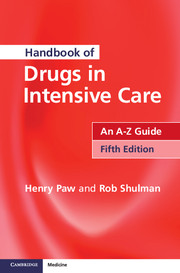Book contents
- Frontmatter
- Contents
- Introduction
- How to use this book
- Abbreviations
- Acknowledgements
- DRUGS: AN A–Z GUIDE
- SHORT NOTES
- Routes of administration
- Loading dose
- Drug metabolism
- Enzyme systems
- Drug excretion
- Drug tolerance
- Drug interactions
- Therapeutic drug monitoring
- Target range of concentration
- Pharmacology in the critically ill
- Cardiopulmonary resuscitation
- Drugs in advanced life support
- Management of acute major anaphylaxis
- Management of severe hyperkalaemia
- Management of malignant hyperthermia
- Sedation, analgesia and neuromuscular blockade
- A practical approach to sedation and analgesia
- Opioid Conversion table
- Management of status epilepticus
- Prevention of delirium tremens and alcohol withdrawal syndrome
- Prevention of Wernicke–Korsakoffsyndrome
- Anti-arrhythmic drugs
- Inotropes and vasopressors
- Bronchospasm
- Anti-ulcer drugs
- Immunonutrition in the ICU
- Corticosteroids
- Short synacthen test
- Bone marrow rescue following nitrous oxide
- Antioxidants
- Post-splenectomy prophylaxis
- Anti-microbial drugs
- Bacterial gram staining
- Antibiotics: sensitivities
- Renal replacement therapy
- Extracorporeal drug clearance: basic principles
- Drug doses in renal failure/renal replacement therapy
- Chemical pleurodesis of malignant pleural effusion
- APPENDICES
- DRUG INDEX
- IV COMPATIBILITY CHART
Bronchospasm
Published online by Cambridge University Press: 05 November 2014
- Frontmatter
- Contents
- Introduction
- How to use this book
- Abbreviations
- Acknowledgements
- DRUGS: AN A–Z GUIDE
- SHORT NOTES
- Routes of administration
- Loading dose
- Drug metabolism
- Enzyme systems
- Drug excretion
- Drug tolerance
- Drug interactions
- Therapeutic drug monitoring
- Target range of concentration
- Pharmacology in the critically ill
- Cardiopulmonary resuscitation
- Drugs in advanced life support
- Management of acute major anaphylaxis
- Management of severe hyperkalaemia
- Management of malignant hyperthermia
- Sedation, analgesia and neuromuscular blockade
- A practical approach to sedation and analgesia
- Opioid Conversion table
- Management of status epilepticus
- Prevention of delirium tremens and alcohol withdrawal syndrome
- Prevention of Wernicke–Korsakoffsyndrome
- Anti-arrhythmic drugs
- Inotropes and vasopressors
- Bronchospasm
- Anti-ulcer drugs
- Immunonutrition in the ICU
- Corticosteroids
- Short synacthen test
- Bone marrow rescue following nitrous oxide
- Antioxidants
- Post-splenectomy prophylaxis
- Anti-microbial drugs
- Bacterial gram staining
- Antibiotics: sensitivities
- Renal replacement therapy
- Extracorporeal drug clearance: basic principles
- Drug doses in renal failure/renal replacement therapy
- Chemical pleurodesis of malignant pleural effusion
- APPENDICES
- DRUG INDEX
- IV COMPATIBILITY CHART
Summary
Causes of wheezing in the ICU
• Pre-existing asthma/COPD
• Anaphylactic reaction
• Aspiration pneumonia
• Kinked tracheal tube
• Tracheal tube too far – carinal/bronchial stimulation
• Bronchial secretions
• Pulmonary oedema
• Pneumothorax
Signs of severe asthma needing intensive care
• Tachycardia (HR > 130/min)
• Pulsus paradox > 20 mmHg
• Tachypnoea (RR > 30/min)
• Absent wheezing
• Exhaustion
• Inability to complete a sentence
• PaCO2 normal or increased
• Hypoxia
The selective β2-agonists such as salbutamol and terbutaline are the treatment of choice for episodes of reversible bronchospasm. Patients with chronic bronchitis and emphysema are often described as having irreversible airways obstruction, but they usually respond partially to the β2-agonists or to the antimuscarinic drugs ipratropium or oxitropium. There is some evidence that patients who use β2-agonists on a ‘PRN’ basis show greater improvement in their asthma than those using them on a regular basis. In the critically ill these drugs will have to be given either nebulised or intravenously. The tracheobronchial route is preferable because the drug is delivered directly to the bronchioles; smaller doses are then required, which cause fewer side-effects. If the bronchospasm is so severe that very little drug gets to the site of action via the tracheobronchial route, then the drug will have to be given IV.
- Type
- Chapter
- Information
- Handbook of Drugs in Intensive CareAn A-Z Guide, pp. 284Publisher: Cambridge University PressPrint publication year: 2014



